 BTC-9090 Fuzzy Logic Micro Processor Based Controller
BTC-9090 Fuzzy Logic Micro Processor Based Controller
Instruction Manual
INTRODUCTION
This manual contains information for the installation and operation of the Brainchild model BTC-9090 Fuzzy Logic micro-processor based controller.
The Fuzzy Logic is an essential feature of this versatile controller. Although PID control has been widely accepted by industries, yet it is difficult for PID control to work with some sophistic systems efficiently, for examples systems of second order, long time-lag, various set points, various loads, etc. Because of disadvantage of controlling principles and fixed values of PID control, it is inefficient to control the systems with plenty of varieties, and the result is obviously frustrating for some systems. The Fuzzy Logic control an overcome the disadvantage of PID control, it controls the system in a efficient way by experiences it had before. The function of Fuzzy Logic is to adjust the PID values indirectly in order to making the manipulation output value MV adjusts flexibly and quickly adapt to various processes. By this way, it enables a process to reach its predetermined set point in the shortest time with minimum overshooting during tuning or external disturbance. Different from PID control with digital information, the Fuzzy Logic is a control with language information.
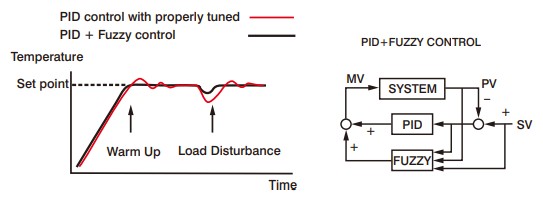
In addition, this instrument has functions of single stage ramp and dwell, auto-tunung and manual mode execution. Ease of use also an essential feature with it.
NUMBERING SYSTEM
Model No. ![]() (1) Power Input
(1) Power Input
| 4 | 90-264VAC |
| 5 | 20-32VAC/VDC |
| 9 | Other |
(2) Signal Input
1 0 – 5V 3 PT100 DIN 5 TC 7 0 – 20mA 8 0 – 10V
(3) Range Code
| 1 | Configurable |
| 9 | Other |
(4) Control Mode
| 3 | PID / ON-OFF Control |
(5) Output 1 Option
| 0 | None |
| 1 | Relay rated 2A/240VAC resistive |
| 2 | SSR Drive rated 20mA/24V |
| 3 | 4-20mA linear, max. load 500 ohms (Module OM93-1) |
| 4 | 0-20mA linear, max. load 500 ohms (Module OM93-2) |
| 5 | 0-10V linear, min. impedance 500K ohms (Module OM93-3) |
| 9 | Other |
(6) Output 2 Option
| 0 | None |
(7) Alarm Option
| 0 | None |
| 1 | Relay rated 2A/240VAC resistive |
| 9 | Other |
(8) Communication
| 0 | None |
FRONT PANEL DESCRIPTION
 INPUT RANGE & ACCURACY
INPUT RANGE & ACCURACY
| IN | Sensor | Input Type | Range( BC ) | Accuracy |
| 0 | J | Iron-Constantan | -50 to 999 BC | A2 BC |
| 1 | K | Chromel-Alumel | -50 to 1370 BC | A2 BC |
| 2 | T | Copper-Constantan | -270 to 400 BC | A2 BC |
| 3 | E | Chromel-Constantan | -50 to 750 BC | A2 BC |
| 4 | B | Pt30%RH/Pt6%RH | 300 to 1800 BC | A3 BC |
| 5 | R | Pt13%RH/Pt | 0 to 1750 BC | A2 BC |
| 6 | S | Pt10%RH/Pt | 0 to 1750 BC | A2 BC |
| 7 | N | Nicrosil-Nisil | -50 to 1300 BC | A2 BC |
| 8 | RTD | PT100 ohms(DIN) | -200 to 400 BC | A0.4 BC |
| 9 | RTD | PT100 ohms(JIS) | -200 to 400 BC | A0.4 BC |
| 10 | Linear | -10mV to 60mV | -1999 to 9999 | A0.05% |
SPECIFICATIONS
INPUT
| Thermocouple (T/C): | type J, K, T, E, B, R, S, N. |
| RTD: | PT100 ohm RTD (DIN 43760/BS1904 or JIS) |
| Linear: | -10 to 60 mV, configurable input attenuation |
| Range: | User configurable, refer to Table above |
| Accuracy: | Refer to Table above |
| Cold Junction Compensation: | 0.1 BC/ BC ambient typical |
| Sensor Break Protection: | Protection mode configurable |
| External Resistance: | 100 ohms max. |
| Normal Mode Rejection: | 60 dB |
| Common Mode Rejection: | 120dB |
| Sample Rate: | 3 times / second |
CONTROL
| Proportion Band: | 0 – 200 BC ( 0-360BF) |
| Reset ( Integral ): | 0 – 3600 seconds |
| Rate ( Derivative ): | 0 – 1000 seconds |
| Ramp Rate: | 0 – 200.0 BC /minute (0 – 360.0 BF /minute) |
| Dwell: | 0 – 3600 minutes |
| ON-OFF: | With adjustable hysteresis (0-20% of SPAN) |
| Cycle Time: | 0-120 seconds |
| Control Action: | Direct (for cooling ) and reverse (for heating) |
| POWER | 90-264VAC, 50/ 60Hz 10VA 20-32VDC/VAC, 50/60Hz 10VA |
ENVIRONMENTAL & PHYSICAL
| Safety: | UL 61010-1, 3rd Edition. CAN/CSA-C22.2 No. 61010-1(2012-05), 3rd Edition. |
| EMC Emission: | EN50081-1 |
| EMC Immunity: | EN50082-2 |
| Operating Temperature: | -10 to 50 BC |
| Humidity: | 0 to 90 % RH (non-codensing) |
| Insulation: | 20M ohms min. ( 500 VDC ) |
| Breakdown: | AC 2000V, 50/60 Hz, 1 minute |
| Vibration: | 10 – 55 Hz, amplitude 1 mm |
| Shock: | 200 m/ s ( 20g ) |
| Net Weight: | 170 grams |
| Housing Materials: | Poly-Carbonate Plastic |
| Altitude: | Less than 2000 m |
| Indoor Use | |
| Overvoltage Category | II |
| Pollution Degree: | 2 |
| Power Input Voltae Fluctuations: | 10% of the nominal voltage |
INSTALLATION
6.1 DIMENSIONS & PANEL CUTOUT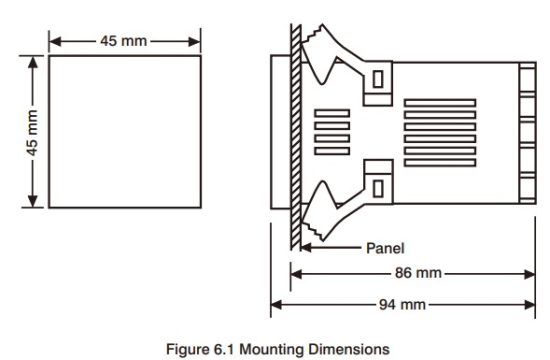 6.2 WIRING DIAGRAM
6.2 WIRING DIAGRAM
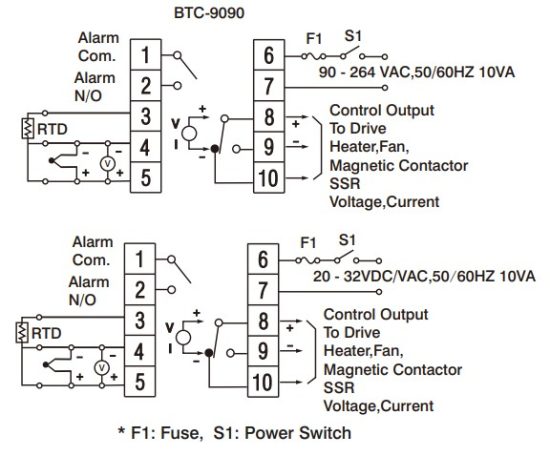
CALIBRATION
Note: Do not proceed through this section unless their is a genuine need to re-calibrate the controller. All previous calibration date will be lost. Do not attempt re-calibration unless you have available appropriate calibration equipment. If calibration data is lost, you will need to return the controller to your supplier who may apply a charge for re-calibration.
Prior to calibration ensure that all parameter settings are correct (input type, C / F, resolution, low range, high range).
- Remove sensor input wiring and connect a standard input simulator of the correct type to the controller input. Verify correct polarity. Set simulated signal to coincide with low process signal (e.g. zero degrees).
- Use the Scroll Key until the ”
 ” appears on the PV Display. (Refer to 8.2)
” appears on the PV Display. (Refer to 8.2) - Use the Up and Down Keys until the PV Display represents the simulated input.
- Press the Return Key for at least 6 seconds(maximum 16 seconds), then release. This enters the low calibration figure into the controller’s non-volatile memory.
- Press and release the Scroll Key. ”
 ” appears on the PV Display. This indicates the high calibration point.
” appears on the PV Display. This indicates the high calibration point. - Increase the simulated input signal to coincide with high 11process signal (e.g. 100 degrees).
- Use the Up and Down Keys until the SV Display represents the simulated high input.
- Press the Return Key for at least 6 seconds (maximum 16 seconds), then release. This enters the high calibration figure into the controller’s non-volatile memory.
- Turn power off the unit, remove all test wiring and replace sensor wiring (observing polarity).
OPERATION
8.1 KEYPAD OPERATION
* With power on, it has to wait for 12 seconds to memorize the new values of parameters once it been changed.
| TOUCHKEYS | FUNCTION | DESCRIPTION |
| Scroll Key | Advance the index display to the desired position. Index advanced continuously and cyclically by pressing this keypad. |
|
| Up Key | Increases the parameter | |
| Down Key | Decreases the parameter | |
| Return Key | Resets the controller to its normal status. Also stops auto-tuning, output percentage monitoring and manual mode operation. | |
| Press |
Long Scroll | Allows more parameters to be inspected or changed. |
| Press |
Long Return | 1. Executes auto-tuning function 2. Calibrates control when in calibration level |
| Press |
Output Percentage Monitor | Allows the set point display to indicate the control output value. |
| Press |
Manual Mode Execution | Allows the controller to enter the manual mode. |
8.2 FLOW CHART The “return” key can be pressed at any time.
The “return” key can be pressed at any time.
This will prompt the display to return to the Process value/Set point value.
Power Applied:
 Displayed for 4 seconds. (Software Version 3.6 or higher)
Displayed for 4 seconds. (Software Version 3.6 or higher) LED test. All LED segments must be lit for 4 seconds.
LED test. All LED segments must be lit for 4 seconds.- Process value and set point indicated.
8.3 PARAMETER DESCRIPTION
| INDEX CODE | DESCRIPTION ADJUSTMENT RANGE | **DEFAULT SETTING | ||
| SV | Set point Value Control *Low Limit to High Limit Value |
Undefined | ||
| Alarm Set point Value * Low Limit to High Limit Value. if * 0 to 3600 minutes ( if * Low Limit minus set point to high Limit minus set point value ( if |
200 BC | |||
| Ramp Rate for the process value to limit an abrupt change of process (Soft Start) * 0 to 200.0 BC (360.0 BF) / minute ( if * 0 to 3600 unit / minute ( if |
0 BC / min. | |||
| Offset Value for Manual Reset ( if |
0.0 % | |||
| Offset shift for process value * -111 BC to 111 BC |
0 BC | |||
| Proportional Band
* 0 to 200 BC ( set to 0 for on-off control) |
10 BC | |||
| Integral (Reset) Time * 0 to 3600 seconds |
120 sec. | |||
| Derivative (Rate) Time * 0 to 360.0 seconds |
30 sec. | |||
| Local Mode 0: No control parameters can be changed 1: Control parameters can be changed |
1 | |||
| Parameter Selection ( allows selection of additional parameters to be accessible at level 0 security) |
0 | |||
| Proportional Cycle Time * 0 to 120 seconds |
Relay | 20 | ||
| Pulsed Voltage | 1 | |||
| Linear Volt/mA | 0 | |||
| Input Mode Selection 0: J type T/C 6: S type T/C 1: K type T/C 7: N type T/C 2: T type T/C 8: PT100 DIN 3: E type T/C 9: PT100 JIS 4: B type T/C 10: Linear Voltage or Current 5: R type T/C Note: T/C-Close solder gap G5, RTD-Open G5 |
T/C | 0 | ||
| RTD | 8 | |||
| Linear | 10 | |||
| Alarm Mode Selection 0: Process High Alarm 8: Outband Alarm 1: Process Low Alarm 9: inband Alarm 2: Deviation High Alarm 10: Inhibit Outband Alarm 3: Deviation Low Alarm 11: Inhibit Inband Alarm 4: Inhibit Process High Alarm 12: Alarm Relay OFF as 5: Inhibit Process Low Alarm Dwell Time Out 6: Inhibit Deviation High Alarm 13: Alarm Relay ON as 7: Inhibit Deviation Low Alarm Dwell Time Out |
0 | |||
| Hysteresis of Alarm 1 * 0 to 20% of SPAN |
0.5% | |||
| BC / BF Selection 0: BF, 1: BC |
1 | |||
| Resolution Selection 0: No Decimal Point 2: 2 Digit Decimal 1: 1 Digit Decimal 3: 3 Digit Decimal (2 & 3 may only be used for linear voltage or current |
0 |
|||
| Control Action 0: Direct (Cooling) Action 1: Reverse (Heat) Action |
1 | |||
| Error Protection 0: Control OFF, Alarm OFF 2: Control ON , Alarm OFF 1: Control OFF, Alarm ON 3: Control ON, Alarm ON |
1 |
|||
| Hysteresis for ON/OFF Control *0 to 20 % of SPAN |
0.5% | |||
| Low Limit of Range | -50 BC | |||
| High Limit of Range | 1000 BC | |||
| Low Calibration Figure | 0 BC | |||
| High Calibration Figure | 800 BC | |||
NOTES: * Adjusting Range of the Parameter
** Factory settings. Process alarms are at fixed temperature points. Deviation alarms move with the set points value.
8.4 AUTOMATIC TUNING
- Ensure that controller is correctly configured and installed.
- Ensure Proportional Band ‘Pb’ is not set at ‘0’.
- Press Return Key for at least 6 seconds ( maximum 16 seconds). This initialises the Auto-tune function. (To abort auto-tuning procedure press Return Key and release).
- The Decimal point in lower right hand corner of PV display flashes to indicate Auto-tune is in progress. Auto-tune is complete when the flashing stops.
- Depending on the particular process, automatic tuning may take up to two hours. Processes with long time lags will take the longest to tune. Remember, while the display point flashes the controller is auto-tuning.
NOTE: If an AT error( ![]() ) occurs, the automatic tuning process is aborted due to the system operating in ON-OFF control(PB=0).
) occurs, the automatic tuning process is aborted due to the system operating in ON-OFF control(PB=0).
The process will also be aborted if the set point is set to close to the process temperature or if there is insufficient capacity in the system to reach set point (e.g. inadequate heating power available). Upon completion of Auto-tune the new P.I.D. settings are automatically entered into the controller’s non-volatile memory
8.5 MANUAL P.I.D. ADJUSTMENT
Whilst the auto-tuning function selects control settings which should prove satisfactory for the majority of processes, you may find it necessary to make adjustments to these arbitrary settings from time to time. This may be the case if some changes are made to the process or if you wish to ‘fine-tune’ the control settings.
It is important that prior to making changes to the control settings that you record the current settings for future reference. Make slight changes to only one setting at a time and observe the results on the process. Because each of the settings interact with each other, it is easy to become confused with the results if you are not familiar with process control procedures.
TUNING GUIDE
Proportional Band
| Symptom | Solution |
| Slow Response | Decrease PB Value |
| High Overshoot or Oscillations | Increase PB Value |
Integral Time (Reset)
| Symptom | Solution |
| Slow Response | Decrease Integral Time |
| Instability or Oscillations | Increase Integral Time |
Derivative Time (Rate)
| Symptom | Solution |
| Slow Response or Oscillations | Decrease Deriv. Time |
| High Overshoot | Increase Deriv. Time |
8.6 MANUAL TUNING PROCEDURE
Step 1: Adjust the integral and derivative values to 0. This inhibits the rate and reset action
Step 2: Set an arbitrary value of proportional band and monitor the control results
Step 3: If the original setting introduces a large process oscillation, then gradually increase the proportional band until steady cycling occurs. Record this proportional band value(Pc).
Step 4: Measure the period of steady cycling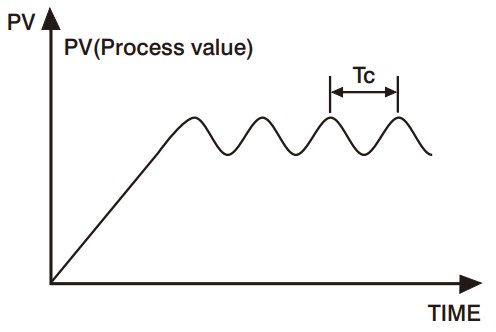 Record this value (Tc) in seconds
Record this value (Tc) in seconds
Step 5: The Control Settings are determined as follows:
Proportion Band(PB)=1.7 Pc
Integral Time (TI)=0.5 Tc
Derivative Time(TD)=0.125 Tc
8.7 RAMP & DWELL
The BTC-9090 controller can be configured to act as either a fixed set point controller or as a single ramp controller on power up. This function enables the user to set a pre-determined ramp rate to allow the process to gradually reach set point temperature, thus producing a ‘Soft Start’ function.
A dwell timer is incorporated within the BTC-9090 and the alarm relay can be configured to provide either a dwell function to be used in conjunction with the ramp function.
The ramp rate is determined by the ‘ ![]() ‘ parameter which can be adjusted in the range 0 to 200.0 BC/minute. The ramp rate function is disabled when the ‘
‘ parameter which can be adjusted in the range 0 to 200.0 BC/minute. The ramp rate function is disabled when the ‘ ![]() ‘ parameter is set to ‘ 0 ‘.
‘ parameter is set to ‘ 0 ‘.
The soak function is enabled by configuring the alarm output to act as a dwell timer. The parameter ![]() needs to be set to the value 12. The alarm contact will now operate as a timer contact, with the contact being closed at power up and opening after the elapsed time set at parameter
needs to be set to the value 12. The alarm contact will now operate as a timer contact, with the contact being closed at power up and opening after the elapsed time set at parameter![]() .
.
If the controller power supply or output is wired through the alarm contact, the controller will operate as a guaranteed soak controller.
In the example below the Ramp Rate is set to 5 BC/minute, ![]() =12 and
=12 and ![]() =15 (minutes). Power is applied at zero time and the process climbs at 5 BC/minute to the set point of 125 BC. Upon reaching set point, the dwell timer is activated and after the soak time of 15 minutes, the alarm contact will open, switching off the output. The process temperature will eventually fall at an undetermined rate.
=15 (minutes). Power is applied at zero time and the process climbs at 5 BC/minute to the set point of 125 BC. Upon reaching set point, the dwell timer is activated and after the soak time of 15 minutes, the alarm contact will open, switching off the output. The process temperature will eventually fall at an undetermined rate.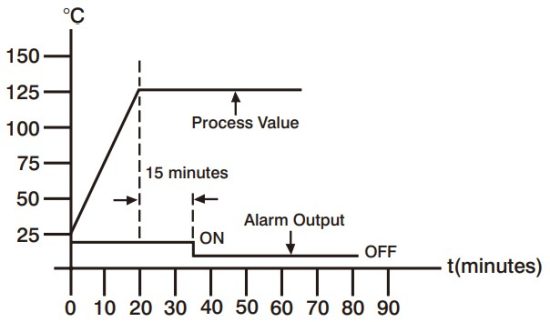 The dwell function may be used to operate an external device such as a siren to alert when a soak time has been reached.
The dwell function may be used to operate an external device such as a siren to alert when a soak time has been reached.
need to be set to the value 13. The alarm contact will now operate as a timer contact, with the contact being open on the initial start up. The timer begins to count down once the set point temperature is reached. After the setting at has elapsed, the alarm contact closes.
ERROR MESSAGES
| Symptom | Cause (s) | Solution (s) |
| Sensor break error | Replace RTD or sensor Use manual mode operation |
|
| Process display beyond the low range set point | Re-adjust value | |
| Process display beyond the high range set point | Re-adjust value | |
| Analog hybrid module damage | Replace module. Check for outside source of damage such as transient voltage spikes | |
| Incorrect operation of auto tune procedure Prop. Band set to 0 | Repeat procedure. Increase Prop. Band to a number larger than 0 | |
| Manual mode is not allowable for an ON-OFF control system | Increase proportional band | |
| Check sum error, values in memory may have changed accidentally | Check and reconfigure the control parameters |

Supplemental Instruction for the New Version
The unit with firmware version V3.7 has two additional parameters – “PVL” and “PVH” located in the level 4 as parameters flow chart on the left hand side.
When you need to change the LLit value to a higher value or change the HLit value to a lower value, following procedures have to be followed to make the PVL value equivalent to one tenth of LCAL value and the PVH alue equivalent to one tenth of HCAL value. Otherwise the measured process values will be out of specification.
- Use the Scroll Key until the “LLit” appears on the PV Display. Use Up and Down Keys to set the LLit value to a higher value than the original value.
- Press and release the Scroll Key, then “HLit” appears on the PV Display. Use Up and Down Keys to set the HLit value to a lower value than the original value.
- Turn the power OFF and ON.
- Use the Scroll Key until the “LCAL” appears on the PV Display. Take a note on the LCAL value.
- Press and release the Scroll Key, then “HCAL” appears on the PV Display. Take a note on the HCAL value.
- Press the Scroll Key for at least 6 seconds and then release, “PVL” appears on the PV Display. Use UP and Down Keys to set the PVL value to one tenth of LCAL value.
- Press and release the Scroll Key, “PVH” appears on the PV Display. Use UP and Down Keys to set the PVH value to one tenth of HCAL value.
-Please install 20A circuit breaker on the power supply end
-To remove the dust please use the dry cloth
-The installation that the safety of any system incorporating the equipment is the responsibility of the assembler of the system
-If the equipment is used in a manner not specified by the manufacturer, the protection provided by the equipment may be impaired
Do not cover the cooling vents to maintain airflow
Beware not to over-tighten the terminal screws. The torque should not exceed . 1 14 N-m ( 10 Lb-in or 11.52 KgF-cm ), temperature Min.60°C, use copper conductors only.
Except the thermocouple wiring, all wiring should use stranded copper conductor with maximum gauge 18 AWG.
WARRANTY
Brainchild Electronic Co., Ltd. is pleased to offer suggestions on the use of its various products.
However, Brainchild makes no warranties or representations of any sort regarding the fitness for use, or the application of its products by the Purchaser. The selection, application or use of Brainchild products is the Purchaser’s responsibility. No claims will be allowed for any damages or losses, whether direct, indirect, incidental, special or consequential. Specifications are subject to change without notice. In addition, Brainchild reserves the right to make changes-without notification to Purchaser-to materials or processing that do not affect compliance with any applicable specification. Brainchild products are warranted to be free from defects in material and workmanship for 18 months after delivery to the first purchaser for use. An extended period is available with extra cost upon request. Brainchild’s sole responsibility under this warranty, at Brainchild’s option, is limited to replacement or repair, free of charge, or refund of purchase price within the warranty period specified. This warranty does not apply to damage resulting from transportation, alteration, misuse or abuse.
RETURNS
No products return can be accepted without a completed Return Material Authorization ( RMA ) form.
NOTE:
Information in this user’s manual is subject to change without notice.
Copyright a 2023, The Brainchild Electronic Co., Ltd., all rights reserved. No part of this publication may be reproduced, transmitted, transcribed or stored in a retrieval system, or translated into any language in any form by any means without the written permission of the Brainchild Electronic Co., Ltd.
 For any repair or maintenance needs, please contact us.
For any repair or maintenance needs, please contact us.
Electronic Co., Ltd.
No.209, Chung Yang Rd., Nan Kang Dist.,
Taipei 11573, Taiwan
Tel: 886-2-27861299
Fax: 886-2-27861395
web site: http://www.brainchildtw.com![]()
Documents / Resources
 |
BrainChild BTC-9090 Fuzzy Logic Micro Processor Based Controller [pdf] Instruction Manual BTC-9090, BTC-9090 G UL, BTC-9090 Fuzzy Logic Micro Processor Based Controller, Fuzzy Logic Micro Processor Based Controller, Micro Processor Based Controller, Processor Based Controller, Based Controller |